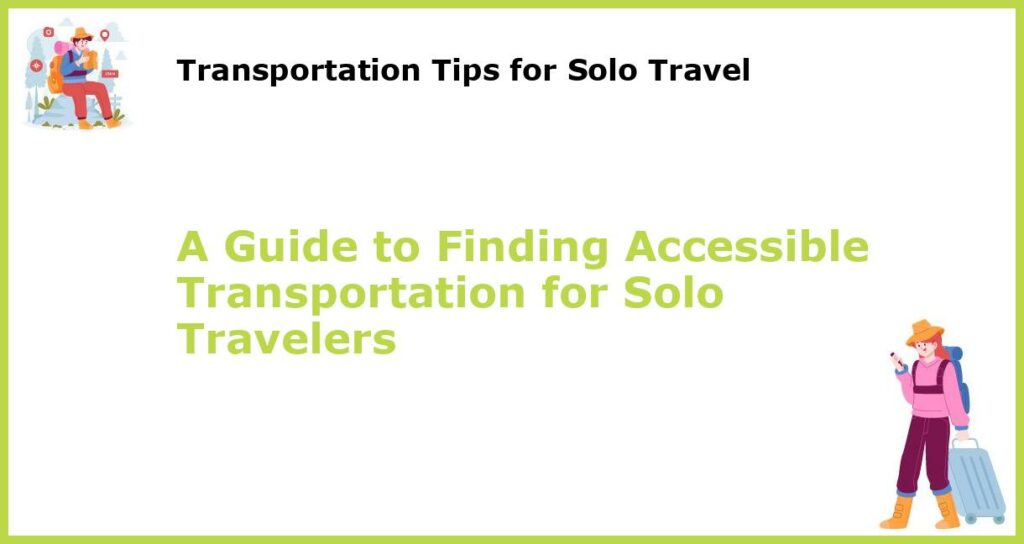Traveling can be a great experience for anyone, and solo travel can be especially liberating. However, for those with accessibility needs, finding the right transportation can be a challenge. This guide will offer some tips on finding accessible transportation for solo travelers.
Plan Ahead

One of the most important things for solo travelers with accessibility needs is to plan ahead. This means doing research on the destination and becoming familiar with the public transportation options available. For example, are there accessible buses, trains or subways that could take you to your destination? Or should you look into private transportation options?
It’s also important to know what services or equipment you might need, like a ramp or a lift. Researching ahead of time can help you make an informed decision on which mode of transportation would be the best fit for your needs. Doing this will help ensure that you have a stress-free transportation experience once you arrive at your destination.
Consider Private Transportation

For some, public transportation may not be an ideal option due to accessibility concerns, especially when it comes to buses, trains or subways. In this case, private transportation options such as ride-sharing services or specialized accessible transportation companies should be considered. Many ride-sharing services, such as Uber or Lyft, offer accessible vehicles. Several companies also provide accessible transportation that cater specifically to people with disabilities. It’s important to be comfortable and feel safe while traveling, so choosing transportation that fits your needs and preferences is crucial.
Be Clear About Your Needs

Once you have chosen your mode of transportation, it’s important to communicate your accessibility needs clearly to the transportation provider. For instance, if you are wheelchair-bound, they need to know that, or if you need a car with seats at the front, which is common for people with pain or mobility issues. This will help ensure a smooth journey, and the transportation provider can make necessary accommodations. By doing this, you won’t be caught off guard, and your ride will be specially tailored to your specific requirements.
Ask for Assistance

It’s always a good idea to ask for assistance if you need it. Transportation providers, such as drivers and bus conductors, are typically more than willing to help passengers with special needs. Even airports and train stations usually have assistance programs for the disabled. For instance, you might need some help getting on and off a train or getting your wheelchair down a ramp. Also, if you’re visually impaired, there are services that can guide you to your connecting flight or to an accessible public restroom. So don’t hesitate to ask for the help you need!
Check for Discounts

If you’re a senior or have a disability, many transit providers offer discounted rates, sometimes even for a companion. Be sure to check with the transportation provider ahead of time to see if you qualify for any special discounts or if you are eligible for any other special rates. For instance, Amtrak offers a 15% discount for travelers with a disability.
Research Local Laws and Regulations

Traveling can be challenging, but knowing the local accessibility laws and regulations can seriously help avoid conflicts with transportation providers. Each country has its own set of regulations, so it’s important that you educate yourself on the accessibility policies of the place you are traveling. By doing so, you won’t be caught off-guard or face any misunderstandings when using public transportation, taxis or accessible transportation services.
Bring the Right Equipment

If you require mobility equipment such as a wheelchair or walker, make sure to pack it when you’re planning your trip. However, keep in mind that some transportation providers have limitations on the size or weight of mobility equipment, so it’s important to check with them ahead of time. Also, note that some airlines, for example, require you to use an aisle chair to board the plane if you are unable to ascend stairs without assistance.
Be Prepared for Delays

As with any form of travel, there’s always the risk of unexpected delays. Unfortunately, delays can be even more common for travelers with disabilities due to the specific type of assistance they might require. It’s a good idea to plan for the potential of delays by having a backup plan in place in case your transportation is delayed or cancelled. For example, you might want to bring a snack or a book, make sure you have a charger for your mobile phone. It’s also good to let someone know where you are and when you plan to arrive at your destination so they can support you in the event of any issues.
Research Taxi Services

When traveling by taxi, it’s important to do your research and find one that suits your accessibility needs. You might consider services with accessible vehicles to make the journey more comfortable. In addition, companies with drivers who have been trained to assist passengers with disabilities can also be beneficial. You might also want to check if they have GPS to prevent getting lost and finding it difficult to communicate with the driver.
Advocate for Yourself
Remember, it’s important not to be afraid to advocate for yourself. If you experience any issues with accessibility during your travels, speak up and communicate your needs clearly to the transportation providers. This can help you feel more comfortable and make sure that your travel experience is positive. If something still goes wrong, like if a taxi driver refused to carry you due to your disability, you can report it to the authorities or the company’s customer service desk.








 You might also be interested in those articles related to solo traveling
You might also be interested in those articles related to solo traveling